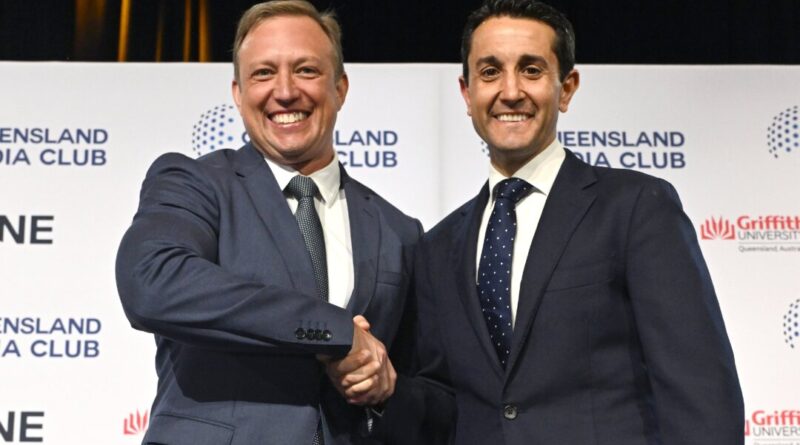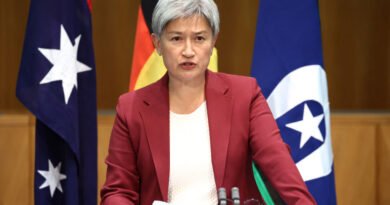Crisafulli and Miles square off in Queensland election, focusing on crime, health, and economy
Crisafulli is advocating for fiscal responsibility and crime reforms, positioning himself as a change candidate, while Miles is defending Labor’s track record and cautioning against potential cuts.
In their second debate, Queensland Premier Steven Miles and Opposition Leader David Crisafulli clashed over key issues such as crime, health, housing, and the economy.
The conversation also delved into abortion laws and state debt, revealing stark differences in their visions for Queensland’s future.
Crisafulli emphasized his commitment to fiscal responsibility, crime reform, and youth justice changes, presenting himself as a candidate for change.
On the other hand, Miles defended his government’s performance, highlighting economic management and infrastructure initiatives while warning of possible cuts under an LNP administration.
Abortion Laws: No Changes Envisioned
One of the most intense discussions centered around abortion laws.
Crisafulli assured voters that the LNP would not alter the existing laws, stating, “My team supports it, and I want Queenslanders to know that we will not change that law.”
He criticized what he described as a “malicious smear campaign” targeting his stance on the issue.
Premier Miles, however, reminded viewers of Crisafulli’s voting history on abortion, highlighting his role in decriminalizing abortion while serving as health minister. Miles accused Crisafulli of evading questions about the issue numerous times.
“Queenslanders are aware of where I stand,” Miles stated. “Crisafulli voted against it and refuses to clarify his position.”
Media outlets and the government have sought to reignite the abortion debate, suggesting that an LNP government could jeopardize “women’s rights.”
State Debt and Economic Policy: A Continuous Battle
State debt and economic management were also focal points of contention.
Crisafulli criticized the government’s handling of state finances, warning that escalating debt could jeopardize Queensland’s AA credit rating. He promised that debt would be lower under an LNP government, vowing to end “multi-billion-dollar projects that are not economically viable.”
Miles dismissed the LNP’s claims, arguing that Queensland’s debt levels were already factored into the state’s stable economic outlook. He highlighted that under Labor’s leadership, the state had achieved two record surpluses and was on track to return to surplus by 2026-27, thanks in part to increased mining royalties tax revenue.
Miles accused Crisafulli of concealing his funding plans for his promises, implying that the LNP might resort to cutting essential services to balance the budget.
Youth Crime and Victim Statistics Debate
Youth crime emerged as a contentious issue, with Crisafulli criticizing the Labor government’s handling of the matter.
He pointed out that despite having a smaller population, Queensland had a higher number of crime victims compared to New South Wales and Victoria.
Miles countered by presenting police data showing a decrease in overall crime this year. He also mentioned that domestic violence statistics were now included in the crime figures, a practice not adopted during the previous LNP government’s tenure.
Miles defended Labor’s community safety plan, which he credited with reducing crime rates, though he acknowledged that more work was needed.
Healthcare Crisis: Diverging Solutions
Healthcare was another major point of contention.
Crisafulli criticized the government for the rise in ambulance ramping under Labor’s watch and the doubling of the waiting list for elective surgery to 62,000 patients. He proposed a comprehensive health strategy in collaboration with third-party medical groups to reduce wait times and enhance hospital infrastructure.
Miles defended Labor’s healthcare record, stating that the government was investing significantly in healthcare infrastructure. He pointed out improvements in ambulance response times and ongoing hospital modernization projects.
Crisafulli also criticized the Labor government for failing to provide forensic exams to rape victims within 10 minutes of arrival at a hospital, citing an audit report. Miles, while not directly refuting the claim, defended the government’s health services record, emphasizing ongoing improvements and a fully funded system.
Olympics 2032: Economic Boost or Burden?
The 2032 Olympics continued to be a topic of debate.
Crisafulli criticized the government’s management of Olympic infrastructure and expressed concern about using the Queensland Sports and Athletics Centre for the opening ceremony. He pledged to review infrastructure sites within 100 days if elected, creating an independent authority to oversee Olympic developments and shield Queenslanders from poorly planned projects’ financial burden.
Miles defended the government’s Olympic approach, asserting that the investments were controlled and aimed at delivering long-term economic benefits for the state. He highlighted current cost-of-living relief measures and the potential of the Olympics to enhance international prestige and economic growth.
Housing Supply Crisis
The housing crisis in Queensland centered on affordability and supply.
Crisafulli criticized the government’s housing policies, noting that Brisbane had become Australia’s second-most expensive city. He proposed a $2 billion fund to incentivize councils to expedite housing construction and pledged to increase supply by constructing more homes. He rejected rent caps as ineffective and emphasized the need for accompanying infrastructure like schools and hospitals for housing developments.
In response, Miles highlighted the government’s review and update of the infrastructure plan and ongoing efforts to address housing shortages. He mentioned new housing projects underway and defended Labor’s long-term strategy to tackle the crisis, albeit at a slower pace than desired.
Final Appeal: A Plea for Trust
In their closing statements, both leaders appealed to voters for support.
Crisafulli framed the election as a choice between crisis and change, promising reform in critical areas like crime, health, and housing under the LNP. He assured voters of the party’s readiness to lead and tackle the state’s pressing challenges.
Miles portrayed himself as a reliable choice, highlighting Labor’s accomplishments from job creation to healthcare enhancements. He cautioned that the LNP’s plans lacked details and could result in cuts to essential services to balance the budget.
As the election approaches, Queenslanders must decide between continuity and stability under Labor or change and fiscal discipline under the LNP.



